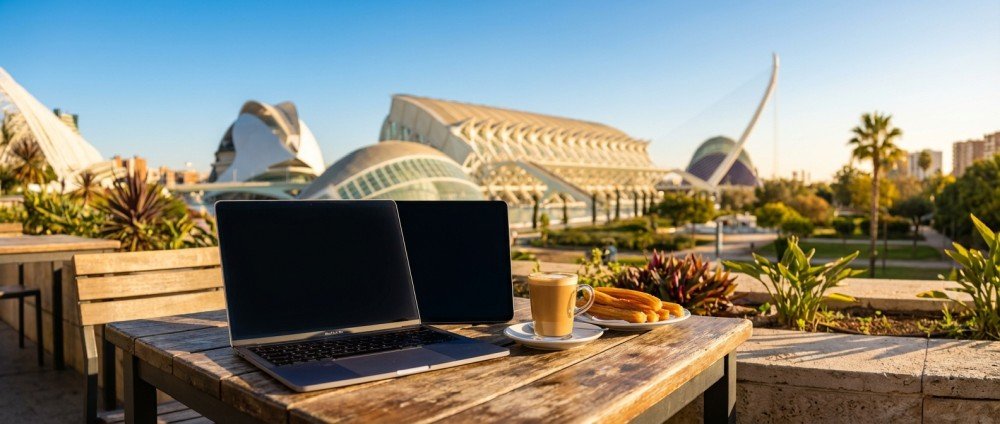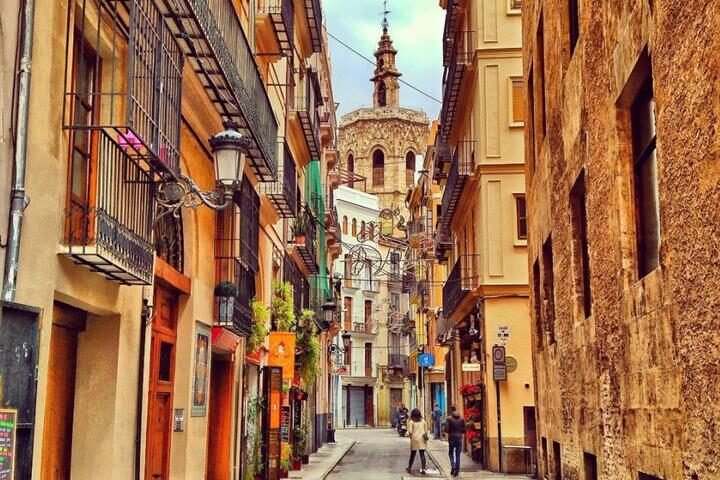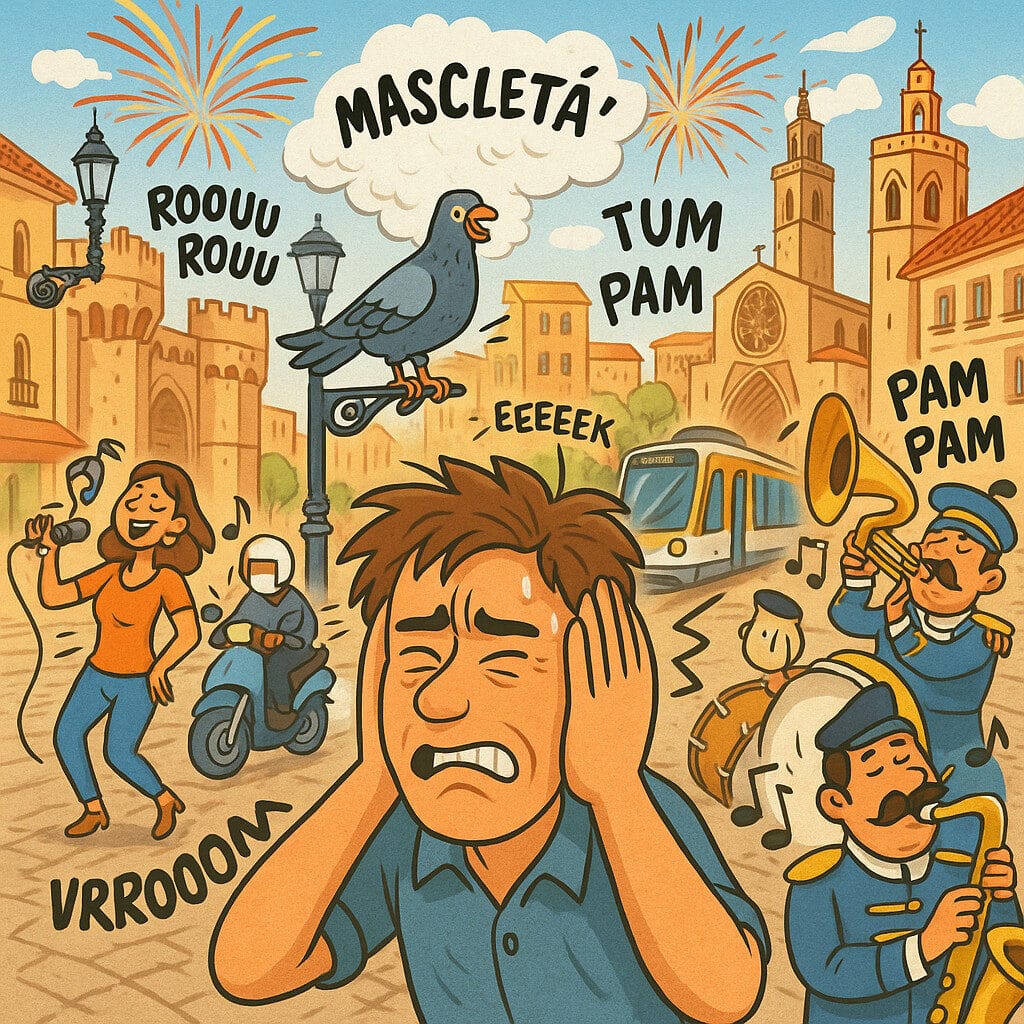A Survivor’s Guide to Paradise (With a Few Plot Twists)
Valencia – the land of eternal sunshine, paella dreams, and zero worries… or so you’ve heard. 😏
If you’re picturing an easy-breezy move to this Mediterranean paradise, plot twist! Even paradise comes with its quirks.
As a seasoned expat, I’m here to hand you a cheeky survival guide. Short on fluff, high on honesty – because living in Valencia is wonderful, and a tad ridiculous in the best ways. Ready? Vamos!
The Paperwork Pyramid of Doom
Ah, Spain – where bureaucracy is practically the national sport.
Welcome to the Paperwork Pyramid of Doom, where one document spawns three more. Want to live in Valencia? Prepare to scale this pyramid step by step (with a sherpa, preferably).
- NIE, TIE, WTF: Your life in Valencia begins with an alphabet soup of permits. You’ll need a NIE (foreigner ID number) for everything from opening a bank account to buying a SIM card. Then a TIE residency card if you plan to stick around. Fun fact: each requires filling out different forms at different offices. Cue the scavenger hunt!
- Photocopy All the Things: Passport, rental contract, your firstborn child – photocopy everything. You’ll quickly learn that una copia, por favor is Spanish for “we love paper.” Bring extra copies of documents and your patience.
- Gestor to the Rescue: Not fluent in Bureaucratese? Hire a gestor, a fixer who navigates red tape for you. This angel-in-human-form will file forms, stand in line, and possibly save your sanity. Money well spent, trust me.
- Stamp of Approval: In Valencia, every form needs an official stamp (or five). Expect to shuttle between windows (that close at 2 p.m. sharp) to collect stamps like Pokémon. No stamp, no glory.
Survival tip: Embrace the absurdity. Treat each office visit like a cultural excursion.
Bring a book, smile at officials (even if they scowl), and remember – eventually, everything gets done… mañana.
Climate Rollercoaster
Valencia’s climate is the envy of Europe – mostly. Over 300 days of sun a year, mild winters, what’s not to love? Well, buckle up: the Climate Rollercoaster has a few surprise drops. 🎢
One minute you’re basking in a balmy February 18°C on a café terrace; the next, you’re shivering in your unheated flat wondering why Spanish buildings lack central heating.
Summers are hot and humid – we’re talking a sauna in August.
You’ll perfect the art of the siesta simply because it’s too darn hot to do anything else between 2 and 5 p.m. And let’s not forget the infamous Gota Fría storms in autumn, when the heavens occasionally open with a biblical downpour flooding streets in minutes.
Expect wardrobe whiplash: flip-flops and sundresses most of the year, but keep a puffer jacket handy for those surprisingly chilly winter nights. In January, inside your flat might feel colder than outside (tiles + no heating = icebox living room).
Portable heaters and cozy blankets will be your best friends. In summer, invest in a fan or five – or better yet, an aircon unit if your landlord was forward-thinking (don’t hold your breath).
Survival tip: Adapt and conquer. Carry sunglasses AND an umbrella. Master the persiana (those roll-down blinds) to keep out heat and sun. And when the heat is unbearable, do as the locals do – hit the beach or flee to the mountains for a weekend cooldown.
The Language Labyrinth
Spanish or Valencian? Sí. In Valencia, you get two languages for the price of one! Welcome to the Language Labyrinth, where street signs read like bilingual tongue-twisters and your brain gets a daily workout.
Officially, Valencia is proudly bilingual (Spanish and Valencian).
Practically, here’s what to expect:
- Double Everything: Streets have two names (Calle Colón is also Carrer Colom). The city itself is Valencia and València. It’s not a typo – just two languages doing their thing. You’ll soon realise “som la ostia” and “¡qué guay!” both mean “this is cool,” depending on who you’re talking to.
- Spanish 101 (and 102): Many locals do speak decent English, especially younger folks and in the city centre. But to truly survive (and thrive), learn Spanish. Even a basic handle on castellano earns you big points and fewer blank stares at the utility company office. Don’t worry about Valencian unless you’re aiming to read regional literature or impress your born-and-bred neighbors. Spanish will do just fine in 99% of situations.
- Language “Help, I’m Lost”: The first time someone answers you in rapid-fire Valenciano, you might panic. Pro tip: politely ask them to switch to Spanish (
"¿Puedes hablar en castellano, por favor?"). Most locals are happy to accommodate – they know their language is a maze for newcomers. - Jokes Aside: Embrace the mix-ups. You’ll accidentally order cansado (tired) instead of casado (married) paperwork, or tell someone you’re embarazada (pregnant) when you meant avergonzado (embarrassed). It’s all part of the fun. Everyone has a cringey language mishap story – laugh it off and learn.
Survival tip: Join a language exchange night or take a Spanish class in Ruzafa. It’s a great way to meet people and untangle the linguistic spaghetti.
And remember, a smile and a “gracias” go a long way, even if your grammar is wonky.
The Mañana Mindset
Living in Valencia means adjusting your internal clock – and expectations. The Mañana Mindset is real, and it will test Type-A personalities hard. In this city, “tomorrow” (mañana) doesn’t always literally mean tomorrow… it just means not today. 😉
Here, life moves at its own pace:
- Need a handyman? He might show up an hour late… or reschedule to next week. Urgency is a relative concept.
- Shops close in the afternoon for siesta, and don’t even think about grocery shopping on a Sunday – the city practically time-travels to the 1950s with everything shut.
- Making plans with locals? Don’t be shocked when dinner is at 10 p.m. and people roll in fashionably late. It’s not rude – it’s cultural jet lag.
At first, you’ll twitch at the inefficiency (standing in a slow-moving bank queue can feel like purgatory). But gradually, you’ll come to appreciate the chilled-out rhythm.
Coffee breaks are sacred, rush hours are mild, and there’s always time to chat. “No pasa nada” (no worries) is basically Valencia’s slogan.
Survival tip: Don’t fight it – join it. Plan ahead for errands (and assume everything takes longer than it should).
Use those siesta hours to rest or stroll the Turia park instead of fuming that the post office is closed.
You moved to Valencia for a better lifestyle, right? The mañana mindset is that lifestyle.
Embrace the slower pace – your blood pressure will thank you.
The Traffic Light Tango
Crossing the road in Valencia is a choreographed dance – and you’re not always leading. The Traffic Light Tango is what happens when traffic planning has a sense of humor. Ever had a light turn red just as you approach, every single time? Welcome to the club. 💃🕺
Expect to wait at pedestrian crossings longer than seems humanly possible. Jaywalking isn’t common here (the locals actually wait, imagine!).
The traffic lights often have their own agenda – a mix of long reds and blink-and-you-miss-it greens. If you’re a driver, prepare for the Valencian merge, where indicators are optional and scooters magically appear from blind spots. Roundabouts? An art form. Pro tip: yield generously and don’t play chicken – buses always win.
There’s also the matter of double parking. Don’t be surprised to find a car parked in the middle of the street, hazard lights blinking, while the driver casually grabs bread from the bakery. It’s the Valencian way of saying “be right back!” You’ll navigate around it, no honking needed (well, maybe a gentle toot if you’re really in a rush).
Survival tip: Whether walking, driving, or cycling, stay alert and flexible. On foot, obey the signals (mostly) but keep an eye out for the rogue bike or scooter. In a car, drive defensively and learn the local hand gestures (some are…colourful). And if you bike, congratulations – you’re now part of the brave (helmeted) few weaving through this tango. Enjoy the ride, literally!
Dogs, Dogs Everywhere (Watch Your Step!)
Love dogs? Great – Valencia loves them even more. Not a dog person? You’ll either convert or learn to coexist with our four-legged overlords. 🐕 Dogs, Dogs Everywhere is not an exaggeration; it’s a way of life.
From chic Chihuahuas in purses to jubilant German Shepherds off-leash at the river park, Valencian pups rule the roost.
Cafés have water bowls out front, there are dog beaches in summer, and you’ll see as many dog strollers as baby strollers (yes, that’s a thing). It’s heartwarming… until you step in something unpleasant on the sidewalk.
Watch your step! The only thing more ubiquitous than dogs themselves might be the little “gifts” they occasionally leave behind.
Many owners are responsible, but let’s just say you’ll get very good at scanning the pavement.
Also, prepare for unsolicited meet-and-greets. Walking your own dog (or just existing near someone else’s) means instant small talk.
Your neighbor’s mutt might wander into your flat if you leave the door open – true story. And if you don’t have a dog, don’t worry, you can vicariously own every dog in your building, given how enthusiastically they’ll greet (or serenade) you daily.
Survival tip: If you value your shoes, invest in good cleaning wipes and a sense of humor.
Join the camaraderie – learn the names of the neighborhood dogs (you’ll know them before you know the owners’ names, guaranteed).
And if you’re considering getting a pet, Valencia’s a pretty pawsome place to be a dog owner. Just, you know, watch out for the caca.
Safe City, Sneaky Fingers
Let’s talk safety. Valencia is generally super safe – you can stroll at midnight by the marina and feel at ease. Violent crime is rare. However, plot twist: it’s the sneaky fingers you need to watch for.
Pickpockets are the unofficial mascots of Spanish cities, and Valencia is no exception. 🎒👀
Don’t get me wrong – you’re not going to be mugged in a dark alley. But leave your phone on a café table or forget to zip your bag in a crowded market, and you might contribute to some thief’s gadget collection.
The central areas, beach, and public transport are playgrounds for petty theft (especially in summer when tourists roam like wide-eyed gazelles). It’s not rampant, but it happens enough that every expat has a “my friend’s wallet got snatched” story.
The good news: a few common-sense habits will make you an unappealing target. Sling that backpack to your front in busy areas, keep a hand on your purse on the metro, and don’t flash wads of cash or your shiny new iPhone around too casually.
Also, pro tip: those breezy open balconies? Don’t leave your laptop in plain sight next to an open window on the ground floor – nimble fingers love a good reach-and-grab opportunity (yes, it’s been known to happen).
Survival tip: Stay aware, not scared. Valencia’s not a den of thieves – far from it. Just be street-smart. When at the beach, take turns watching belongings if you want to swim. In busy fallas festivals or Christmas markets, keep valuables secured.
Basically, treat Valencia like any big city: trust the vibe (it’s relaxed) but lock your bike twice and keep your zipper closed. You’ll be fine – promise.
Embrace the Chaos and Enjoy the Paradise
By now you’re probably thinking, “Yikes, do I really want to live in Valencia?” Here’s the final plot twist: absolutely. 😄
For all the tongue-in-cheek warnings, Valencia remains an incredible place to call home.
In fact, it’s because of these quirks that expats end up falling hopelessly in love with the city.
You’ll swap horror stories about the extranjería office and laugh about that time you got locked in a bank lobby (don’t ask). You’ll curse the humidity and then spend Christmas Day sipping Agua de Valencia in the sun, utterly charmed.
In Valencia, the line between paradise and circus sometimes blurs – and that’s the fun of it. One day you’re navigating a strike at the tram station, the next you’re cycling through orange-blossom-scented streets thinking “wow, I actually live here.”
This city will keep you on your toes, sure, but it will also give you Mediterranean magic at every turn: golden beaches, vibrant festivals, friendly faces, and a laid-back lifestyle that’s second to none.
So, if you’re ready to live in Valencia, come with an open mind, a dash of humor, and this survivor’s guide in your back pocket. Paradise is waiting – plot twists and all. Bienvenido/a a Valencia, and buena suerte… you’re going to love it. 😉
FAQ
1. What are the initial administrative hurdles for someone looking to live in Valencia?
Here’s the cleaned and improved version:u003cbru003eBrace yourself for Valencia’s u0022Paperwork Pyramid of Doomu0022—a bureaucratic gauntlet that makes obtaining a driver’s license look like child’s play. Your first quest: securing the NIE (Número de Identidad de Extranjero), a foreigner ID number that unlocks virtually everything else. Without it, you can’t open a bank account, get a SIM card, sign a lease, or complete most other adult tasks.u003cbru003ePlanning to stay long-term? Add the TIE (residency card) to your to-do list—a separate process requiring different forms, different offices, and the patience of a saint. Expect to produce multiple photocopies of every document you own (and some you didn’t know existed), navigate labyrinthine government offices, and decipher instructions that seem designed to confuse.u003cbru003eHere’s the insider secret: hire a gestor. These professional bureaucracy navigators are worth every euro, handling the paperwork maze, waiting in endless queues, and ensuring you obtain all the mysteriously essential stamps and signatures. They’re not just convenient—they’re a sanity-saving investment that transforms a months-long ordeal into a manageable inconvenience.u003cbru003eConsider their fee the price of keeping your mental health intact.
2. How unpredictable is Valencia’s climate, and what are the best ways to prepare for it?
Yes, Valencia delivers those legendary 300+ days of sunshine and mild Mediterranean winters—but calling it a u0022Climate Rollercoasteru0022 isn’t hyperbole. The weather here specializes in extremes that catch newcomers off guard.u003cbru003eAugust transforms the city into a full-body sauna, where humidity clings like a second skin and afternoon siestas become survival strategy rather than cultural quirk. Then winter arrives with a plot twist: despite mild outdoor temperatures, your apartment becomes an icebox. Blame the tile floors, single-pane windows, and shocking absence of central heating. You’ll find yourself colder indoors than out, huddled under blankets while it’s a perfectly pleasant 15°C outside.u003cbru003eAutumn introduces the u0022Gota Fríau0022—sudden torrential downpours that transform streets into rivers within minutes, flooding underpasses and catching umbrella-wielding optimists completely unprepared.u003cbru003eSurvival requires wardrobe schizophrenia: keep flip-flops and sundresses accessible nine months of the year, but also invest in a proper puffer jacket and portable heater for those deceptively cold indoor nights. Master the art of the persianas (those roll-down blinds on every window) to block August’s relentless sun, and consider air conditioning or fans non-negotiable rather than luxury.u003cbru003eThink layers, flexibility, and the acceptance that weather logic doesn’t always apply here.
3. What should newcomers understand about the language situation in Valencia?
Welcome to Valencia’s u0022Language Labyrinth,u0022 where bilingualism isn’t just official policy—it’s daily reality. Street signs appear in duplicate, city names toggle between Spanish and Valencian, and you’ll occasionally wonder if you’ve learned the wrong language entirely.u003cbru003eThe good news: many locals, particularly younger residents and city center dwellers, speak English well enough to rescue confused newcomers. The reality check: to actually live here rather than merely survive, Spanish is non-negotiable. Valencian, while culturally rich and beloved by locals, remains optional unless you’re committed to deep cultural immersion.u003cbru003ePrepare yourself for moments when rapid-fire Valencian leaves you nodding blankly. A polite u0022¿Podemos hablar en castellano?u0022 usually does the trick, and most locals switch seamlessly without offense. You’ll mix up words, botch verb conjugations, and occasionally order something wildly different from what you intended.u003cbru003eTreat these linguistic stumbles as tuition payments in your u003ca href=u0022https://mikebastin.com/international-schools-in-valencia/u0022 data-type=u0022postu0022 data-id=u002224847781u0022u003eValencia educationu003c/au003e—embarrassing in the moment, funny in retrospect, and ultimately essential to feeling at home.
4. How does the Mañana Mindset impact daily life in Valencia, and how can one adapt to it?
The u0022Mañana Mindsetu0022 isn’t just a stereotype—it’s a way of life in Valencia. Here, u0022tomorrowu0022 exists in a fluid temporal space that might mean next week, and urgency is a charmingly flexible concept. That handyman who promised to come Tuesday? He’ll arrive eventually, possibly Thursday, maybe next month.u003cbru003eThis relaxed rhythm permeates everything: shops close for sacred siesta hours each afternoon, most businesses shutter entirely on Sundays, and dinner invitations for 10 p.m. actually mean 10:30 (at the earliest). Plans are suggestions, schedules are aspirational, and u0022just five minutesu0022 could mean anything up to an hour.u003cbru003eThe secret to sanity? Adjust your expectations accordingly. Build buffer time into every errand, treat siesta closures as permission to linger over lunch or nap guilt-free, and abandon any notion of punctuality as you knew it. Fighting this rhythm will only raise your blood pressure—embracing it unlocks the relaxed Mediterranean lifestyle that makes Valencia so appealing in the first place.u003cbru003eConsider it forced practice in the art of slowing down.
5. What unique challenges do pedestrians and drivers face in Valencia, especially concerning traffic?
Welcome to Valencia’s u0022Traffic Light Tangou0022—a dance where pedestrians always seem to arrive just as the signal flips to red. Expect marathon waits at crosswalks, though you’ll notice locals dutifully waiting rather than jaywalking, even when streets appear deserted.u003cbru003eBehind the wheel, you’ll quickly discover the u0022Valencian mergeu0022: a graceful maneuver where turn signals are merely decorative and scooters materialize from impossible angles. Roundabouts demand equal parts confidence and clairvoyance, while double-parked cars with blinking hazards serve as impromptu traffic cones throughout the city.u003cbru003eThe key to survival? Stay hyper-alert and embrace flexibility. Whether you’re walking, driving, or cycling, assume nothing and expect everything. Defensive driving isn’t just recommended here—it’s an essential life skill.
6. What should newcomers expect regarding the prevalence of dogs in Valencia?
Valencia’s love affair with dogs goes beyond the typical European dog-friendly city—it’s practically a canine utopia. You’ll spot them everywhere: tiny breeds peeking from designer purses, larger dogs romping unleashed through parks, and everything in between. Cafes set out water bowls as routinely as they serve cortados, and dog strollers rival baby carriages in frequency on the streets.u003cbru003eIt’s undeniably charming, though it comes with a caveat: sidewalk navigation requires constant vigilance for u0022giftsu0022 left behind. On the upside, dog ownership here is an instant social lubricant—expect impromptu conversations and fast-track neighborhood integration. Even without a dog of your own, you’ll become intimately acquainted with everyone else’s four-legged companions.u003cbru003eThe secret to thriving in Valencia’s dog-centric culture? Keep quality shoe wipes handy and cultivate a healthy sense of humor about the whole situation.
7. How safe is Valencia generally, and what specific precautions should one take
Valencia is considered super safe regarding violent crime, allowing for comfortable late-night strolls. However, the main concern is sneaky fingers, referring to pickpockets. These petty thefts are common in central areas, at the beach, and on public transport, especially during tourist seasons.u003cbru003eu003cbru003eThe advice is to be street-smart rather than scared: keep phones secure, zip bags in crowded areas, and avoid flashing valuables. u003cbru003eSimple habits like wearing backpacks on the front in busy spots and not leaving electronics near open ground-floor windows are effective deterrents. The key is awareness and common sense, treating Valencia like any other major city in terms of protecting valuables.
8. Despite these challenges, why is Valencia still considered a paradise to live in?
Despite the administrative complexities, climate quirks, language challenges, the slow Mañana Mindset, traffic idiosyncrasies, prevalence of dogs, and petty theft concerns, Valencia remains an incredible place to call home. u003cbru003eThe blend of paradise and circus creates a dynamic and charming experience. Valencia offers Mediterranean magic with golden beaches, vibrant festivals, friendly people, and a laid-back lifestyle that is second to none. u003cbru003eThe overall message is to approach living in Valencia with an open mind and a sense of humor, as the rewards of its unique charm far outweigh the minor inconveniences.






